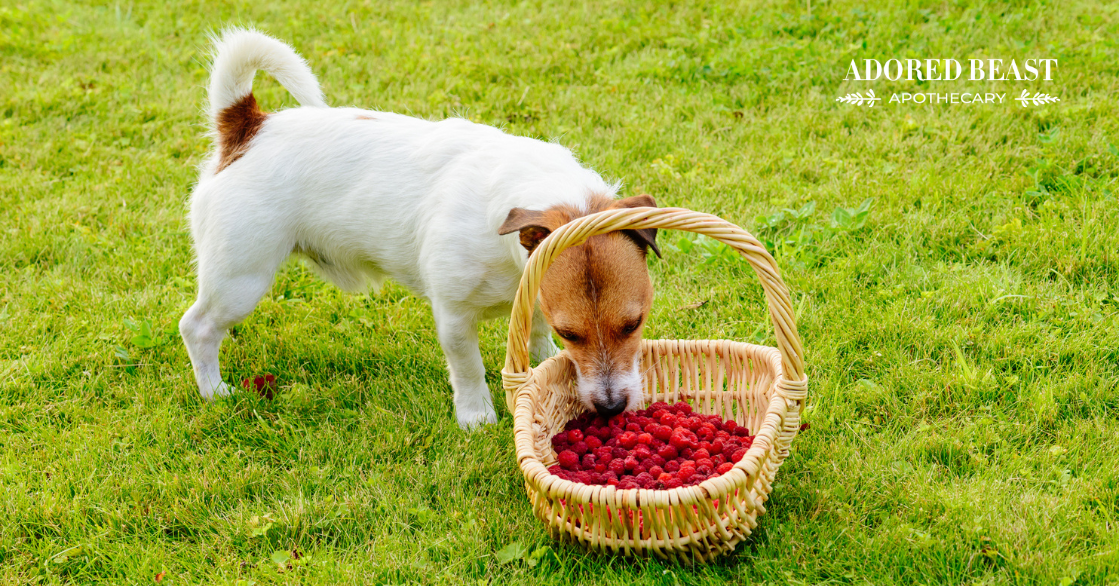Depending on where you live, raspberry season may be kicking off! Up here in Canada, we have a few more weeks to wait, but it’s coming… and as far as I’m concerned, that’s definitely something to celebrate.
When you’re snacking on fresh berries this summer, you may notice your pup giving you those big, pleading, puppy dog eyes. It’s tempting to share, but is it safe? Let’s answer this juicy question right off the hop: can dogs eat raspberries? Spoiler alert: Yes, they can! These little red gems are not only delicious but also packed with nutrients that can benefit your dog’s health.
Can Dogs Eat Raspberries?
As mentioned, raspberries are a go for dogs. In fact, raspberries may be small, but they’re mighty when it comes to nutrition. Here’s what makes them great for dogs:
- Antioxidants – Help fight free radicals and inflammation
- Vitamin C – Supports immune function and tissue repair
- Fiber – Aids digestion and keeps things moving smoothly
- Manganese – Supports bone health and metabolism
- Low in sugar and calories – A guilt-free treat!
They even contain ellagic acid, a compound known for its anti-cancer and anti-inflammatory properties. Pretty impressive for a tiny berry!
This nutrient profile makes them a favourite for a variety of reasons. Here’s why raspberries deserve a spot in your pup’s fruit rotation:
- Boost immune system health thanks to the high antioxidant levels
- Support joint health with natural anti-inflammatory properties — great for aging or arthritic dogs
- Aid digestion with a healthy dose of fiber
- Good for weight management due to their low-calorie content
Other Berries (& Fruits) Dogs Can Enjoy
Raspberries aren’t the only fruity superstars for our canine companions! And if you know ABA, you know we’re big fans of rotation and variety in the diet! Here are some other dog-friendly options:
Safe berries for dogs:
- Blueberries – High in antioxidants and great for the brain
- Strawberries – Packed with vitamin C and help whiten teeth
- Blackberries – Another fiber-rich, antioxidant-packed choice
Other fruits dogs can eat:
- Bananas – A potassium-rich energy boost
- Apples – Great source of vitamins A and C
- Watermelon – Hydrating and refreshing on hot days
- Pineapple – Full of digestive enzymes and vitamins
- Peaches – Offer vitamin A and fiber, but never feed the pit or canned peaches in syrup
- Oranges – Packed with vitamin C, but give in small amounts due to sugar content and acidity
- Mango – Loaded with vitamins A, C, E, and B6 — a tropical treat your pup will love
Always remove pits, seeds, and tough skins, and feed fruits in moderation. Natural sugars can add up quickly!
Easy Raspberry Treat Recipe for Dogs
Want to turn raspberries into a tasty DIY dog treat? Try this Frozen Raspberry Coconut Bites recipe. It’s simple, nutritious, and a perfect way to beat the summer heat!
Ingredients:
- 1/2 cup fresh or frozen raspberries (look for organic if possible)
- 1/2 cup plain unsweetened kefir
- 1 tbsp coconut oil (melted)
Instructions:
- Blend raspberries, kefir, and coconut oil in a blender until smooth.
- Pour the mixture into silicone molds or an ice cube tray.
- Freeze for 3–4 hours or until solid.
- Pop out and serve to your pup on a hot day!
Storage: Keep in the freezer for up to two weeks – if they last that long!
So, can dogs eat raspberries? Absolutely! As an occasional treat, they’re a safe and nutritious way to spoil your adored beast. With antioxidants, fiber, and anti-inflammatory benefits, raspberries are a berry good choice for dogs! Just remember to keep portions small and avoid overfeeding. Want to explore more fruity treats? Try mixing up your dog’s snack game with other safe berries and fruits, or get creative in the kitchen with homemade treats like our raspberry coconut bites. Your pup will thank you with a happy tail wag!












